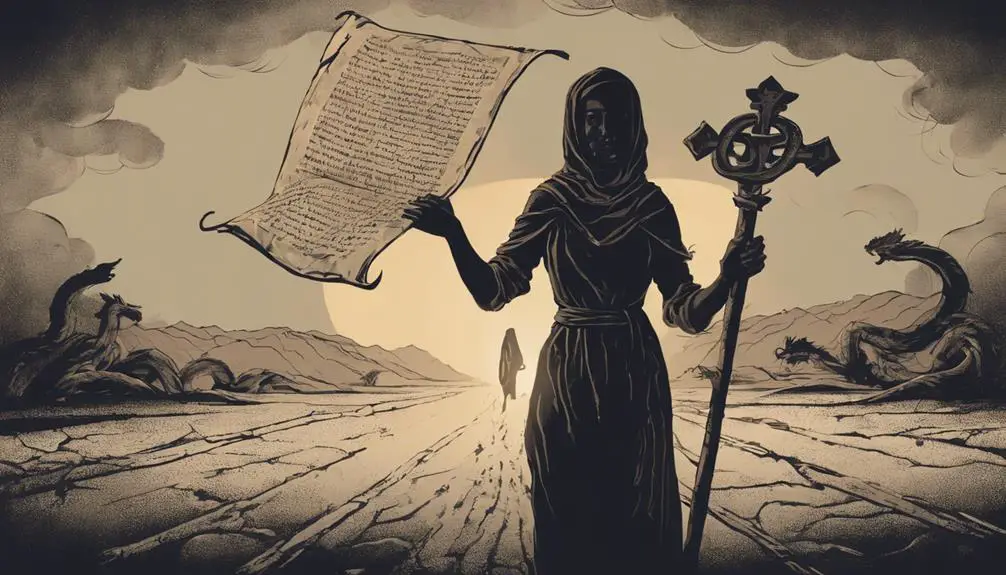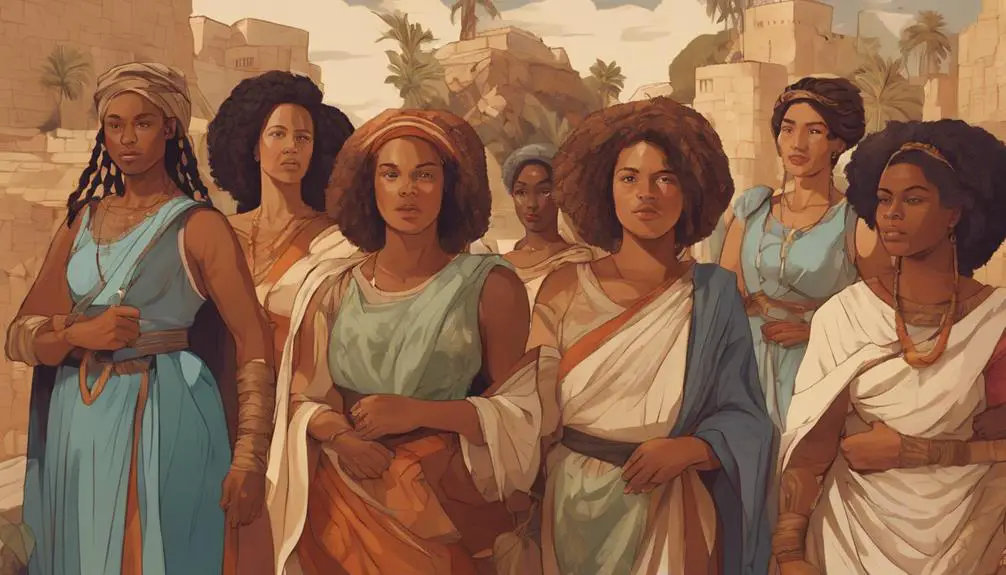Morality and mischief intertwine in biblical tales of women, prompting a reflection on ancient texts and their modern implications.

Immoral Woman in the Bible Meaning
In today's digital age, the concept of an 'immoral woman' in the Bible might seem like an outdated term, yet it's laden with complex meanings and cultural contexts that still resonate.
You'll find that the Bible does not shy away from presenting women in multifaceted roles, some of which have been labeled as immoral by contemporary standards. By exploring notable women and their stories, you'll uncover how cultural contexts and gender roles have shaped the interpretation of morality.
This journey into biblical narratives offers a fresh lens through which to view moral lessons and their implications for today, prompting a reflection on how these ancient texts mirror or contrast with modern societal values.
Key Takeaways
- Immorality in biblical terms extends beyond actions to a state of being contrary to God's commandments.
- Stories of women like Rahab and Deborah highlight redemption and the possibility of moral transformation.
- Cultural and patriarchal contexts influenced perceptions of women and morality in the Bible.
- Understanding biblical narratives about women offers insights into ethical living and challenges contemporary views on morality and gender roles.
Defining Immorality in Biblical Terms

In biblical terms, immorality encompasses a range of behaviors deemed contrary to God's commandments, including but not limited to sexual misconduct, dishonesty, and idolatry. This broad spectrum of actions reflects humanity's sinful nature, a concept deeply embedded in scripture. You're faced with the idea that all humans are born with an inclination towards sin, a condition that separates them from divine purity and necessitates the intervention of divine grace for redemption.
Analyzing immorality through a biblical lens, it's clear that the concept isn't merely about individual acts of wrongdoing but rather a state of being that contrasts sharply with the holiness required by God. The scriptures underscore that without divine grace, overcoming one's sinful nature is an insurmountable task. This grace, freely offered but often challenging to fully embrace, is the key to transcending the inherent immorality that characterizes human existence.
The emphasis on sinful nature and divine grace in discussing immorality serves to highlight the complexity of achieving moral rectitude without divine intervention. It underscores the necessity of seeking and accepting divine grace to overcome the inherent tendencies toward behaviors that deviate from God's commandments.
Notable Women and Their Stories

Reflecting on the concept of immorality within biblical terms reveals an intricate tapestry of human nature and divine grace, a narrative further enriched by examining the stories of notable women in the scriptures. These stories aren't merely historical accounts but serve as powerful lessons on female leadership and redemption narratives, highlighting the complexities of morality and the possibilities for transformation.
One finds, for instance, the account of Rahab, a woman who, despite her profession as a prostitute, played a pivotal role in the Israelite spies' safety. Her story underscores the potential for redemption and the importance of faith, transcending her initial societal label. Similarly, the narrative of Deborah, a prophetess and judge, exemplifies strong female leadership. Her courage and wisdom led Israel to victory, challenging conventional views on the roles women could occupy.
These biblical accounts serve as a reminder that the path to divine grace and moral rectitude isn't confined to a single narrative. They encourage a reevaluation of quick judgments and underscore the transformative power of faith and redemption. Through their stories, the Bible illustrates that redemption and leadership are accessible to all, regardless of past actions or societal labels.
Cultural Contexts and Gender Roles

Understanding cultural contexts and gender roles is crucial for comprehensively interpreting the stories and teachings about women in the Bible. The narratives, often steeped in patriarchal influences, reflect the societal norms of the times. These norms significantly dictated the lives of women, placing them in roles that were largely subordinate to men. It's essential to grasp that these stories were written in a time when patriarchal systems governed societies, influencing how women's actions were perceived and judged.
Societal norms of the era portrayed in the Bible typically relegated women to the domestic sphere, limiting their public and religious roles. This framework not only shaped their daily lives but also influenced the interpretation of their moral and ethical actions within the scriptural texts. Women who deviated from these expectations could quickly be labeled as immoral, often without consideration of their personal circumstances or motivations.
Analyzing these stories through the lens of the cultural and gender-specific contexts of their time allows for a more nuanced understanding. It highlights how patriarchal influences and societal norms have historically shaped perceptions of morality, particularly concerning women's roles and behaviors. Such an analysis is indispensable for a scholarly and objective interpretation of biblical narratives about women.
Moral Lessons and Interpretations

Having established the cultural and gender contexts that shaped women's roles in biblical times, we now turn our attention to the moral lessons and interpretations these narratives offer. Throughout the Bible, stories of women often plunge into ethical dilemmas, challenging you to reflect on your own moral compass. These tales aren't just ancient history; they're a mirror reflecting the timeless struggle between right and wrong, good and evil.
You're invited to see beyond the surface of these stories, to the deeper meaning that underscores the importance of personal repentance and moral integrity. The Bible doesn't shy away from depicting the complexities of human nature, offering you a chance to learn from the successes and failures of its characters. Through their journeys, you're prompted to consider your own path to personal repentance, understanding that it's never too late to turn towards a more ethical and righteous way of living.
In essence, these biblical narratives serve as a guide, illustrating how to navigate life's moral quandaries with wisdom and courage. They encourage you to examine your actions and motivations, fostering a deeper commitment to ethical living and personal growth.
Contemporary Reflections and Relevance

In today's ever-evolving society, the biblical narratives of women and their moral complexities continue to offer invaluable insights into ethical living and personal integrity. These stories, while ancient, have modern implications that resonate with contemporary issues of gender, morality, and societal impacts. By analyzing these narratives, one can discern the underlying messages that transcend time and culture, urging a reflection on personal and societal values.
The portrayal of so-called 'immoral women' in the Bible, when assessed with a critical and contemporary lens, reveals the multifaceted nature of human morality and the often subjective interpretation of virtue and vice. This analysis prompts a reevaluation of societal norms and the stigmatization of women based on outdated moral frameworks. The societal impacts of these stories are profound, as they influence current debates on gender roles, sexuality, and moral judgment.
Understanding these biblical narratives in the context of modern implications offers a pathway towards fostering a more inclusive and empathetic society. It challenges individuals to question and redefine their perceptions of morality, encouraging a shift towards a more equitable and compassionate understanding of human behavior and ethics.
Frequently Asked Questions
How Have Interpretations of Immorality Among Women in the Bible Changed With Different Translations Over the Centuries?
Interpretations of women's immorality in the Bible have evolved due to translation bias and cultural relativity.
As you delve into different translations over the centuries, you'll notice how societal norms and biases shape the portrayal of women.
This shift reflects changing attitudes towards gender and morality.
It's crucial to analyze these texts critically, acknowledging how cultural contexts influence our understanding of biblical immorality.
This evolution underscores the fluidity of interpretation across time and cultures.
Are There Instances Where What Was Considered Immoral Behavior for Women in the Bible Is Now Seen in a More Positive or Neutral Light?
Yes, cultural shifts and feminist reinterpretations have led to a more positive or neutral view of behaviors once deemed immoral for women in the Bible.
For example, assertiveness and sexual autonomy, previously criticized, are now often celebrated for embodying strength and independence.
This reevaluation highlights the evolving understanding of morality and the importance of context, demonstrating how perceptions of biblical women's actions have transformed over time.
How Do Non-Christian Religions and Secular Perspectives Interpret the Stories of Women Labeled as Immoral in the Bible?
From non-Christian and secular viewpoints, stories of women labeled as immoral in the Bible are often interpreted through lenses of cultural relativism and mythological analysis.
You'd find scholars and followers suggesting that these narratives reflect societal norms and values of their time, rather than universal truths.
They analyze these stories to understand the evolution of moral standards and to explore the mythological roles that these women play within their cultural contexts.
What Role Do Apocryphal Texts Play in Understanding the Concept of Immorality Among Women in the Biblical Context?
You'll find that apocryphal texts offer deep insights into the concept of immorality among women in biblical times.
These writings, while not included in the standard biblical canon, hold textual significance for scholars seeking a broader understanding of societal norms and individual behaviors.
Through apocryphal insights, you'll uncover narratives and perspectives that challenge and enrich traditional interpretations, providing a more nuanced view of women's roles and reputations in ancient religious contexts.
How Has the Concept of Immorality in the Bible Influenced Legal and Societal Norms Regarding Women's Rights and Behaviors Over Time?
You're exploring how biblical concepts of immorality have shaped gender legislation and societal expectations about women's rights and behaviors. This influence extends from legal systems to everyday norms, often embedding traditional roles and limitations deeply within cultures.
Analyzing these trends reveals a complex interplay between religious texts and societal structures, highlighting how ancient narratives continue to impact contemporary debates over gender equality and women's autonomy in both the public and private spheres.
Conclusion
In summarizing, it's crucial to recognize that biblical narratives about 'immoral women' are deeply embedded in their cultural and historical contexts. These stories aren't just ancient texts but reflect complex gender dynamics and moral teachings relevant even today.
By analyzing these accounts, you gain insights into how morality and immorality were construed and the profound impact of cultural and gender roles on these perceptions. Thus, contemporary reflections on these stories can offer valuable lessons in ethics and human behavior.



Sign up